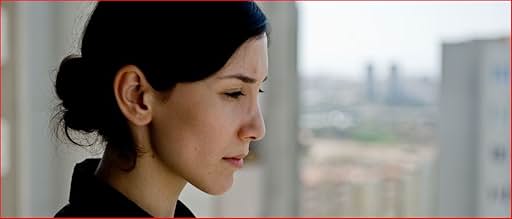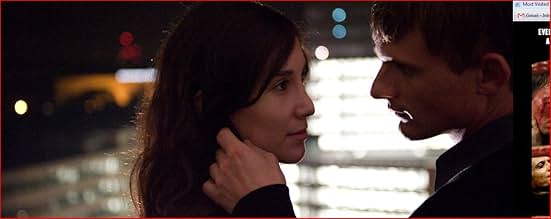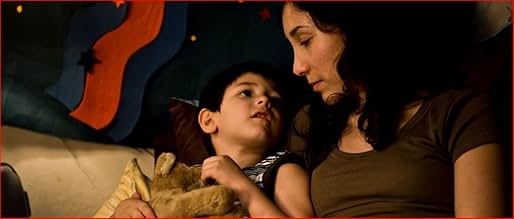VALUTAZIONE IMDb
7,5/10
5659
LA TUA VALUTAZIONE
Umay, una giovane donna di origine turca, lotta per una vita indipendente e autodeterminata in Germania contro la resistenza della sua famiglia. La sua lotta dà inizio a una dinamica che si ... Leggi tuttoUmay, una giovane donna di origine turca, lotta per una vita indipendente e autodeterminata in Germania contro la resistenza della sua famiglia. La sua lotta dà inizio a una dinamica che si traduce in una situazione di pericolo di vita.Umay, una giovane donna di origine turca, lotta per una vita indipendente e autodeterminata in Germania contro la resistenza della sua famiglia. La sua lotta dà inizio a una dinamica che si traduce in una situazione di pericolo di vita.
- Regia
- Sceneggiatura
- Star
- Premi
- 30 vittorie e 14 candidature totali
Gümeç Alpay Aslan
- Zeynep
- (as Gümec Alpay)
Recensioni in evidenza
The film she she is a victim of the traditional culture, in the cultural system of human nature, she just husband and home accessories, and is never her own most of the world are all traditional male-dominated roles if which day I hope the human progress in addition to the increasingly advanced technology and the trend of men's and women's position is equal
Within 30 seconds of the film's opening scene, we know we're entering a complex, and very real world.
Later we see Umay, our lead character, lying on a doctor's table and we immediately fall in love with her. There is something magical and loving about the way the camera moves around her. That's all the character development we need, but this heroine (and I mean this in a literal sense; Umay, to me, is a hero in the best sense of the word) continues to evolve and reveal amazing traits in a complicated situation that mere mortals would fold under.
This Turkish film is about familial bonds, deep and abiding love and human rights. It attempts to bridge the gap between traditional cultures and their inherent focus on family as one's primary means of survival, and post-industrial (Western) culture in which human rights and dignity are of paramount importance.
'When We Leave' reminds us westerners of what we sacrificed in the name of economic and political progress while illuminating what is now, to us, a little-understood truth: The "Old Days" weren't always "The Good old Days."
I cannot recommend this film highly enough. Sibel Kekilli's performance as Umay must be the finest role, male or female, of the entire year. And what a face! One could watch the entire film with no audible dialog and be transfixed throughout by this wonderful actor's countenance. Too bad she won't be considered for a Oscar!
Later we see Umay, our lead character, lying on a doctor's table and we immediately fall in love with her. There is something magical and loving about the way the camera moves around her. That's all the character development we need, but this heroine (and I mean this in a literal sense; Umay, to me, is a hero in the best sense of the word) continues to evolve and reveal amazing traits in a complicated situation that mere mortals would fold under.
This Turkish film is about familial bonds, deep and abiding love and human rights. It attempts to bridge the gap between traditional cultures and their inherent focus on family as one's primary means of survival, and post-industrial (Western) culture in which human rights and dignity are of paramount importance.
'When We Leave' reminds us westerners of what we sacrificed in the name of economic and political progress while illuminating what is now, to us, a little-understood truth: The "Old Days" weren't always "The Good old Days."
I cannot recommend this film highly enough. Sibel Kekilli's performance as Umay must be the finest role, male or female, of the entire year. And what a face! One could watch the entire film with no audible dialog and be transfixed throughout by this wonderful actor's countenance. Too bad she won't be considered for a Oscar!
The basic plot is simple: a young lady with a crazy in-laws feds up and leaves making her a total outcast. The acting seemed a bit too dramatic and overly polished. The actors are obviously talented and have done their best, but it showed that they were trying too hard, which took away the realism I was anticipating. More than a few scenes were simply yelling and slapping which I've found quite raw. The close-ups were nice generally with beautiful faces, occasionally with oblique views. At times, when we were shown a scene with people staring at each other silently which meant that the discussion was over, I wondered if that was really the case and not if we were witnessing a zen moment. As a side note, I just have to point out that the subject of film has little to do with religion or being a "muslim". The problem is far too deep which is really a sociological phenomena rooted in dogmatic cultural upbringings and a feudal life style (mostly) of the eastern part of country where people are just a dot in the family picture rather than individuals with autonomy. You could see that nobody in the family wanted to be a part of what was going on but they could not behave otherwise -- they were slaves of their communities even thousands of miles away.
This is such a difficult film to watch. It's the story of a Turkish woman trying to rise up beyond her culture and religion to pursue her autonomy. It's painful to watch given the strong performances/direction and script which will both shock you and get you reflecting on the current state of affairs.
The protagonist encounters various obstacles towards her pursuit of happiness, sadly within her own family. This is relatable regardless of your gender, cast or creed. The main actress Sibel Kekilli does a fantastic job of drawing the viewer into her turmoil. The pain she endures was truly palpable. A beautiful film.
The protagonist encounters various obstacles towards her pursuit of happiness, sadly within her own family. This is relatable regardless of your gender, cast or creed. The main actress Sibel Kekilli does a fantastic job of drawing the viewer into her turmoil. The pain she endures was truly palpable. A beautiful film.
After seeing this film, I assumed it was directed by a Turkish director named Feo Aladag. When I googled this name, a picture of a young blond woman filled the screen. As it turned out, Feo Aladag is an Austrian actress/director, married to Turkish/German author Zuli Aladag, who is also the producer of Die Fremde.
I mention this because I think it is important. In this film, the Turkish community in Germany is not pictured in a very favourable way. The story shows the fate of Umay, a young Turkish/German woman who wants a divorce because her husband beats her and because, perhaps more importantly, she doesn't love him. She leaves her husband and moves with her young son to her family in Berlin. Surprisingly, her father and brother take sides with her husband and urge her to return to him. In their view, she has dishonoured her husband and her own family by separating her son from his father. This conflict escalates in a dramatic way, with terrible consequences.
The film pictures Umay as a woman who is denied her 'Western' rights as a woman and a mother, and shows her family as driven by 'non-Western' values like honour and tradition. For them, the community is superior over the individual. For her, it's the other way round.
The message is pessimistic. Umay is a Turkish woman who adopts the German lifestyle. She wants to live her own life. She follows the integration model that the Turkish people in Western Europe are supposed to follow. But her brother and sister don't support her, although they are born and raised in Germany. They speak the German language, but think the Turkish way.
Like some of the films of Faith Akin (in which lead actress Sibel Kekilli also starred) this film focuses on the problems of the Turkish community in Germany. But it has a darker and more pessimistic tone. It's a very powerful movie, dealing with a very urgent issue.
I mention this because I think it is important. In this film, the Turkish community in Germany is not pictured in a very favourable way. The story shows the fate of Umay, a young Turkish/German woman who wants a divorce because her husband beats her and because, perhaps more importantly, she doesn't love him. She leaves her husband and moves with her young son to her family in Berlin. Surprisingly, her father and brother take sides with her husband and urge her to return to him. In their view, she has dishonoured her husband and her own family by separating her son from his father. This conflict escalates in a dramatic way, with terrible consequences.
The film pictures Umay as a woman who is denied her 'Western' rights as a woman and a mother, and shows her family as driven by 'non-Western' values like honour and tradition. For them, the community is superior over the individual. For her, it's the other way round.
The message is pessimistic. Umay is a Turkish woman who adopts the German lifestyle. She wants to live her own life. She follows the integration model that the Turkish people in Western Europe are supposed to follow. But her brother and sister don't support her, although they are born and raised in Germany. They speak the German language, but think the Turkish way.
Like some of the films of Faith Akin (in which lead actress Sibel Kekilli also starred) this film focuses on the problems of the Turkish community in Germany. But it has a darker and more pessimistic tone. It's a very powerful movie, dealing with a very urgent issue.
Lo sapevi?
- QuizGermany's official submission for the Best Foreign Language Film Award at the 83rd Annual Academy Awards in 2011.
- ConnessioniFeatures Biçak Sirti (2007)
- Colonne sonoreSO 36 - Party
Performed by Steffen Irlinger & Marian Mülle
(P) 2010 Colosseum Music Entertainment GmbH
I più visti
Accedi per valutare e creare un elenco di titoli salvati per ottenere consigli personalizzati
- How long is When We Leave?Powered by Alexa
Dettagli
- Data di uscita
- Paese di origine
- Siti ufficiali
- Lingue
- Celebre anche come
- When We Leave
- Luoghi delle riprese
- Aziende produttrici
- Vedi altri crediti dell’azienda su IMDbPro
Botteghino
- Lordo Stati Uniti e Canada
- 19.631 USD
- Fine settimana di apertura Stati Uniti e Canada
- 6018 USD
- 30 gen 2011
- Lordo in tutto il mondo
- 1.338.132 USD
- Tempo di esecuzione
- 1h 59min(119 min)
- Colore
- Mix di suoni
- Proporzioni
- 2.35 : 1
Contribuisci a questa pagina
Suggerisci una modifica o aggiungi i contenuti mancanti


























